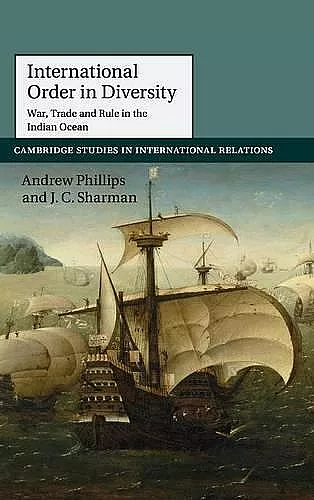International Order in Diversity
War, Trade and Rule in the Indian Ocean
Andrew Phillips author J C Sharman author
Format:Hardback
Publisher:Cambridge University Press
Published:23rd Apr '15
Currently unavailable, and unfortunately no date known when it will be back
This hardback is available in another edition too:
- Paperback£24.99(9781107446823)

This book explains how a diverse Indian Ocean international system arose and endured during Europe's crucial opening stages of imperial expansion.
International relations scholars typically expect political communities to resemble one another the more they interact. This book examines how Portuguese explorers, rapacious Dutch and English trading companies, and mighty Islamic empires like the Mughals all interacted and co-existed in the Indian Ocean during the first phases of European global expansion.International relations scholars typically expect political communities to resemble one another the more they are exposed to pressures of war, economic competition and the spread of hegemonic legitimacy standards. However, historically it is heterogeneity, not homogeneity, that has most often defined international systems. Examining the Indian Ocean region - the centre of early modern globalization - Andrew Phillips and J. C. Sharman explain how diverse international systems can emerge and endure. Divergent preferences for terrestrial versus maritime conquest, congruent traditions of heteronomy and shared strategies of localization were factors which enabled diverse actors including the Portuguese Estado da India, Dutch and English company sovereigns and mighty Asian empires to co-exist for centuries without converging on a common institutional form. Debunking the presumed relationship between interaction and homogenization, this book radically revises conventional thinking on the evolution of international systems, while deepening our understanding of a historically crucial but critically understudied world region.
'This superb historical sociological exploration of the Indian Ocean system in effect provides a compelling and vitally important double-provincialisation of Westphalia: first, by revealing how heteronomous rather than (Westphalian) homogenous international orders have constituted the norm in world political history; and second, by revealing the critical point that the standard Westphalian logic of homogenization reflects a Eurocentric conception that simply does not stand up when applied to the non-Western world.' John M. Hobson, University of Sheffield
'Exceptionally clear and accessible, this is an excellent contribution to theories of international continuity and change and theories of system dynamics. It also has interesting implications for our understanding of state transformation.' Dan Nexon, Georgetown University, Washington DC, and Lead Editor, International Studies Quarterly
'This book makes a major theoretical and empirical contribution. Theoretically, it greatly advances our understanding of how diverse political organizations may interact in regional international systems. Empirically, it elucidates how the Indian Ocean presented an inter-ecumenical zone that synergistically braided European, Middle East and Asian influences in early modernity.' Hendrik Spruyt, Norman Dwight Harris Professor of International Relations, Northwestern University, Illinois
'This is a remarkable book. In only about 250 pages it seeks to provide a new way of looking at how international relations should be taught. It is also, in international relations terms, seeking to bring the Indian Ocean in from the cold.' Keith Suter, Journal of the Indian Ocean Region
- Joint winner of Robert L. Jervis and Paul W. Schroeder Best Book Award, International History and Politics Section, American Political Science Association 2016
ISBN: 9781107084834
Dimensions: 229mm x 152mm x 16mm
Weight: 540g
274 pages